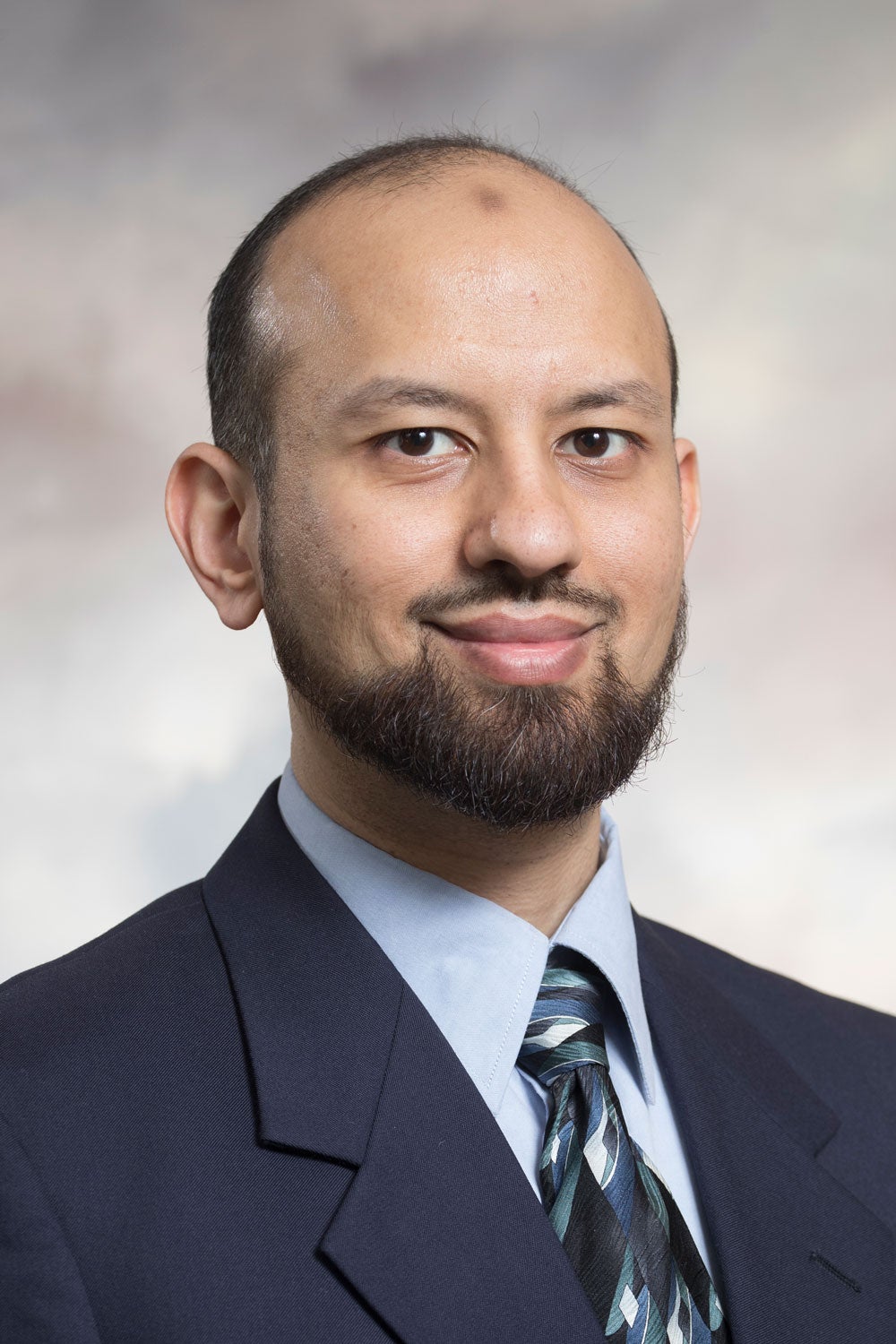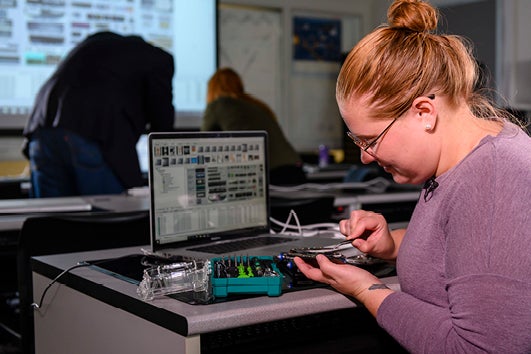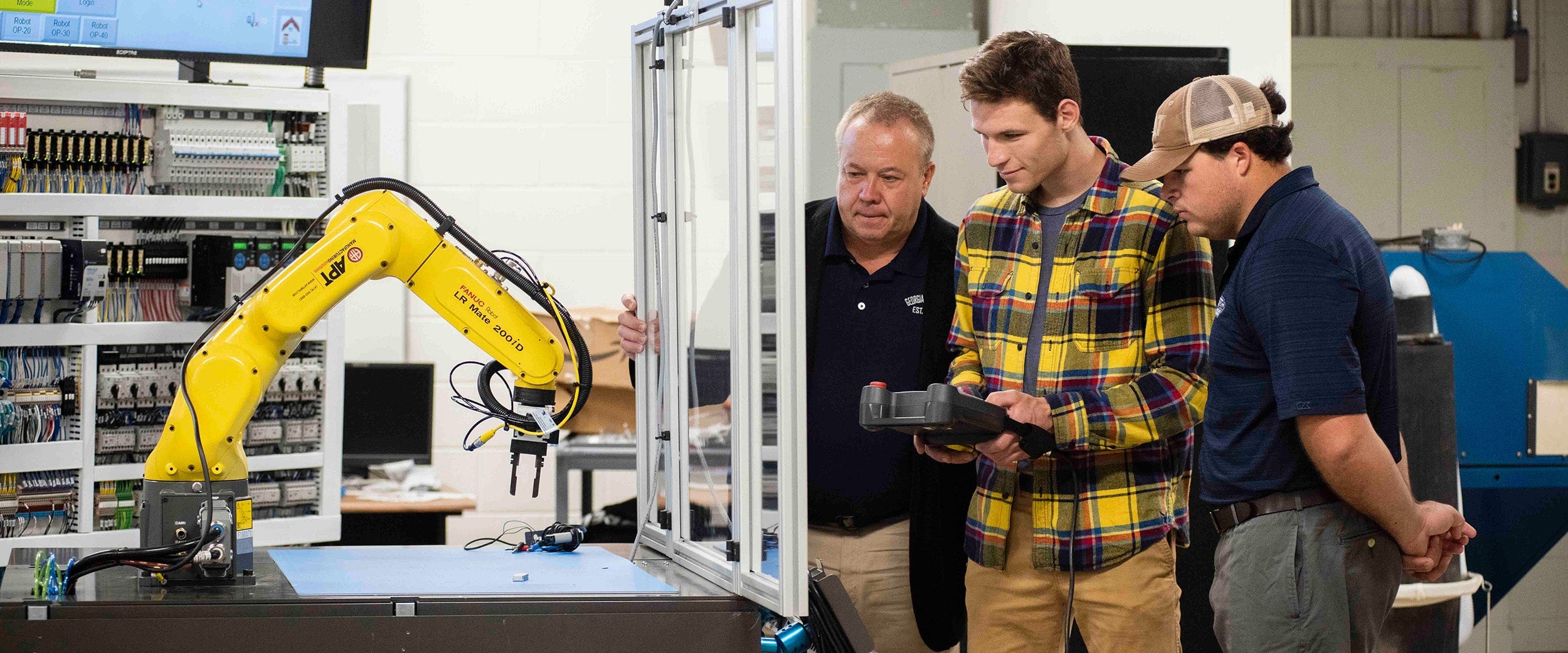Upgrade your technical and leadership abilities for advanced engineering positions in some of today’s most in-demand fields.
Locations
- Statesboro Campus (In Person)
- Armstrong Campus (In Person)
- Online
- The VECTR Center (Warner Robins, GA)
Why Earn a Master’s in Electrical and Computer Engineering at Georgia Southern?
- Combine technical expertise with advanced skills in research and communication to prepare for leadership.
- Develop familiarity with leading technologies and techniques in well-equipped labs.
- Benefit from personalized attention with small class sizes.
- Flexible program delivery options help you accelerate your career around your schedule.
- 30 credit hours to completion.
Build on your background to acquire high-level professional and technical skills for the next phase of your engineering career. Georgia Southern University’s Master of Science (M.S.) in Electrical and Computer Engineering program meets the need for engineering managers and professionals who possess both a wealth of practical knowledge and leadership abilities and are ready to drive innovation in consumer, commercial and industrial fields.
On-campus and online delivery methods serve full-time students preparing to make an impact in entry-level roles and currently employed engineers seeking to augment their existing skills and knowledge.
Courses encourage you to engage in rigorous analytical investigation and experimental research in areas such as autonomous systems, optical communications, wireless power, small antennas and energy harvesting. With a choice of concentrations plus thesis and non-thesis tracks, you can shape your training to design the perfect résumé for your professional goals.
Ready to Apply?
What Can You Do With a Master’s in Electrical and Computer Engineering?
Specialized knowledge of your focus area, practical experience with state-of-the-art technology and research skills equip you to move into new and expanded roles as an engineer. Manage teams or direct transformative studies in industry or government. Or, leveraging your thesis, continue your education in a Ph.D. program to launch your academic career.
Where our graduates work:
- Government
- Health care
- Manufacturing
- Power and energy
- Research and development
- Robotics
- Technology
- Telecommunications
What our graduates do:
- Consultant
- Engineering manager
- Hardware design engineer
- Robotics engineer
- Senior electrical engineer
- Systems engineer
What You’ll Learn
All students take courses in advanced signal processing and digital control systems and thoroughly explore research methods used in electrical and computer engineering. This sequence further strengthens their technical communication skills and understanding of professional ethics.
Then, students customize their studies by choosing a concentration in electrical engineering or computer engineering, both of which pair required courses with a choice of electives to fine-tune their training.
See the CurriculumProgram Formats
Tailor your studies based on your interests and goals. Choose a thesis to prepare for research or Ph.D. programs or the non-thesis option to enhance your professional qualifications in a subdiscipline or application.
Thesis
Structuring a formal research project under individual faculty guidance, you’ll craft and publicly defend a written thesis on the basis of your investigations. This format showcases your originality of thought and helps you establish your authority for further studies.
Non-Thesis
Hone your problem-solving skills by designing an experiment, investigating a topic or undertaking independent research that strengthens your résumé and your expertise.
Concentrations
Go deep in the area that aligns with your career plans, adding a focused set of electives to the program’s core requirements.
Electrical Engineering
Gain competence in the design, development and testing of electrical equipment and components, including in contexts ranging from electric motors to communications systems.
Computer Engineering
Focus on developing and deploying the computer systems and components at the heart of modern technology, including how they integrate with mechanical systems in robotics and more applications.
Research
Dive into exploration and innovation with up-to-date equipment, joining faculty in specialized facilities like the Antennas and Wireless Propagation Lab and the Robotics and Intelligent Operations Systems Lab.
About ECE Research
Want to Learn More?
Explore essential information about our M.S. in Electrical and Computer Engineering program, including application details, accreditation status, and licensing disclosures. Gain insight into the program’s credibility and requirements to help you start your journey toward success with the knowledge you need.
Applicants for the M.S. in Electrical and Computer Engineering program must have completed a bachelor’s degree in electrical or computer engineering or a closely related field at a regionally accredited institution with a minimum cumulative GPA of 2.75 (on a 4.0 scale).
To apply, please submit:
- An online application. (There is a $50 nonrefundable application fee.)
- Official English language test scores (TOEFL or IELTS; required only for international applicants whose native language is not English).
All supporting materials should be submitted directly to the Office of Graduate Admissions at gradadmissions@georgiasouthern.edu.
International transcripts must be evaluated by a NACES-accredited evaluation service. The evaluation must be course-by-course and include a GPA.
Application Deadlines
Students are admitted to begin in the fall and spring semesters. The application deadlines are as follows:
| Fall | Spring | |
|---|---|---|
| Priority Deadline | March 1 | October 1 |
| Final Deadline | July 1 | November 15 |
Your application and all required documents must be received by the deadline.
Provisional Admission
Applicants may be granted provisional admission based upon the recommendation of the Master of Science in Electrical Engineering Graduate Program Director or Department Chair.
Contact Information
Sungkyun Lim, Ph.D.
Graduate Program Director
912-478-2266
sklim@georgiasouthern.edu
Faculty Feature
Study with faculty who are innovators and outstanding teachers. Dr. Salman Siddiqui, recipient of the University’s teaching award, publishes on STEM instruction while researching fault-tolerant robotic configurations.
Learn More About Dr. Siddiqui

Take the Next Step
Get equipped for innovative engineering leadership in Georgia Southern’s practically focused, tech-infused master’s in electrical and computer engineering program.
Contact Us
Sungkyun Lim, Ph.D.
Graduate Program Director
Department of Electrical and Computer Engineering
P.O. Box 8045, Statesboro, GA 30460
Phone: 912-478-2266
Email: sklim@georgiasouthern.edu



